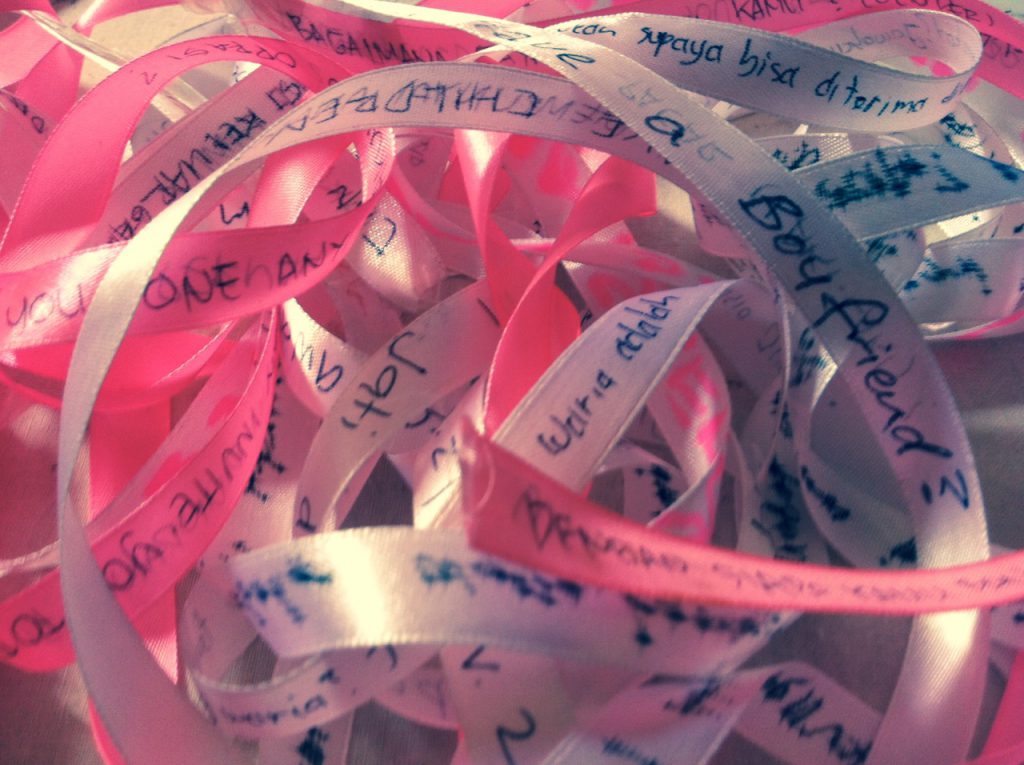by Dee Putri
Waria is a term used in Indonesian for assigned-male-at-birth (AMAB) transgender people. It originally comes from words wanita (woman) and pria (man). (Indonesian loves to make acronyms, I’ll tell you.)
words wanita (woman) and pria (man). (Indonesian loves to make acronyms, I’ll tell you.)
Seeing waria on the street is not strange; I see them everyday working as pengamen – street performers. They usually sing in intersections or near food booths. I’d never really had a conversation with waria before, only small interactions here and there, like months ago when I was picking my nephew up from his pre-school. In the intersection, we saw some waria and he started calling them, “Hiiiiiiii, hiiiiiiii!” The waria became so happy and they said “hi” back to my nephew. Then my nephew dropped his hat on the street, they kindly helped me to take it. I said, “thank you” and that was all.
Then I had the opportunity to talk to waria trough Jimmy Ong’s project, Talk to Her. Jimmy’s project is part of Makcik Project. (Makcik has the same meaning as waria):
Each makcik collaborator becomes the hostess, or the homeowner. Anyone who enters the living room becomes her guest. During each encounter, both the hostess and the guest are granted at least three questions or 15 minutes to ask of each other. With one-on-one dyad, Ong opens up a chance for people to know the makciks up close and personal. At the same time, Ong is also setting a neutral ground between the makciks and the public, attempting to void the existing social stigma surrounding the makciks for 15 minutes. – Jimmy Ong
I talked to three waria. I don’t think that I can share what we talked about, because it was their personal stories. If you want to see what some people asked during the project, you can see it here. Just like any other person, waria have their own stories and their very own issues: with themselves, with their parents, their friends, their neighbors, their teachers, and everything else. Different person, different issues. If you speak Indonesain, you can also read Hidup Sebagai Waria by Koeswinarno to know more about waria in Yogyakarta, including their personal stories.
Waria are living such hard lives because of social norms in Indonesia that don’t really help them. Since the of majority people in Indonesia are Moslem, it’s hard to be waria openly because people judge. Common people think that warias are failures in society and that waria don’t know religion at all. But if you think that waria are not religious, you’re so wrong. A waria named Mariani even built Pondok Pesantren Al Fatah in Yogyakarta so waria can pray freely, because waria are prohibited from going to masjid (mosque).
It is also hard for waria to find a decent job. They can’t reall apply to government jobs, because the government hasn’t “approved” waria status yet–waria would need to use their previous (male) pronouns and name to apply, rather than their actual names and pronouns. Also, the goverment is discriminative towards waria. Kartu Tanda Penduduk (KTP) (identity cards) in Indonesia only have options for male and female. According to Yuli Rustinawati of Arus Pelangi (Rainbow Stream), an LGBT charity in Jakarta, gender ID is “a grey area in Indonesian law. The national government recognizes sex but not gender, or – in other words – the result of realignment surgery, but not the process.” According to advocacy group Lembaga Swadaya Masyarakat Keluarga Besar Waria Yogyakarta (LSM Kebaya), waria often work as street performers (16%), in hair salons (14%), as LGBT activist (5%), as sex workers (47%), entrepreneurs (11%), teachers (1%), tailors (1%), or laborers (1%). Only 1% of surveyed waria were college students. Most waria can’t attend college because of money issues (since many waria run away from their homes), or because people discriminate against them.
I think it is important for us to respect waria’s identities. It’s unfair to limit waria’s choices of work or life just because they are waria. I watched an interview about people who work with waria, and one of them waria featured that it is her way to show others that waria, just like anyone else, are good people that you can rely on. The stereotype that all waria are sex workers is invalid–and even for those waria who are sex workers, it’s not because they’re “bad.” Waria face many struggles, including having few opportunities because of their educational background and the discrimination they face. So why don’t we stop judging them?
You can read more:
Waria of Yogyakarta: Islam, Gender, and National Identity by Lily Zwaan
My tumblr page, Rosy Purple
